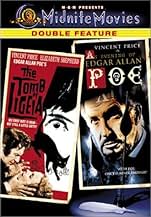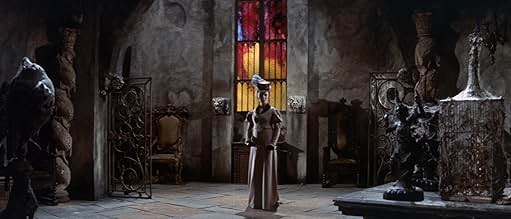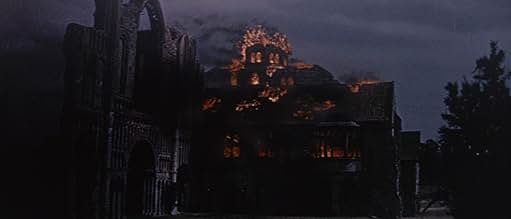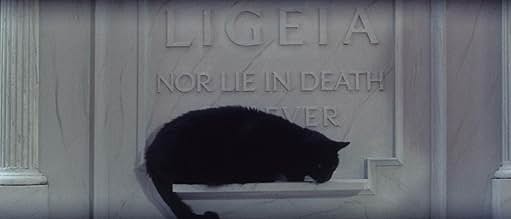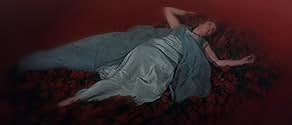AVALIAÇÃO DA IMDb
6,4/10
7,3 mil
SUA AVALIAÇÃO
A obsessão de um homem por sua esposa morta cria uma distância entre ele e sua nova noiva.A obsessão de um homem por sua esposa morta cria uma distância entre ele e sua nova noiva.A obsessão de um homem por sua esposa morta cria uma distância entre ele e sua nova noiva.
- Direção
- Roteiristas
- Artistas
Maxwell Craig
- Wedding Guest
- (não creditado)
Anthony Lang
- Wedding Guest
- (não creditado)
Del Watson
- Footman
- (não creditado)
Fred Wood
- Wedding Guest
- (não creditado)
- Direção
- Roteiristas
- Elenco e equipe completos
- Produção, bilheteria e muito mais no IMDbPro
Avaliações em destaque
Well, at least for a little while! His last of eight Poe films as director is (loosely) based on the Poe work of the same name and is a solid metaphorical ghost story. Lady Rowena (the wonderful Elizabeth Shepherd) falls in love with Verden Fell (Vincent Price) despite his strange behavior and questionable past. Soon after their marriage, he starts disappearing, she's menaced by that old Poe stand-by (the evil black cat) and plagued by horrific nightmares involving Verden's deceased former wife Ligeia (also played by Shepherd), whose ghost seems intent on ruining the union. Price, in top hat and strange sunglasses in many scenes (his vision being "dangerously acute"), seems a bit too old for the role, but still manages to come through with an effective performance. Corman has always been underrated for effectively capturing period detail on a limited budget and it's his keen eye for the crumbling ruins, lush green countrysides, oceanfronts and shadowy castle corridors that make much of this film work. Screenplay by future Oscar-winner Robert Towne (CHINATOWN). LIGEIA was Corman's last horror film as director until 1990's FRANKENSTEIN UNBOUND.
The genius of Edgar Allan Poe lies in his ability to create atmosphere and to draw us in with the power of his magically evocative language. As not a great deal happens in his stories and his characters are thinly drawn, film adaptors feel obliged to invent, expand, elaborate and embellish and this, the last of Roger Corman's versions of Poe, is certainly no exception. The liberties taken and the additions made by Robert Towne are too numerous to mention and include mesmerism and a hint of necrophilia!
The major change is that the marriage between Verden Fell and his second wife, Lady Rowena, is based upon love and not mutual loathing. Their characters have been fleshed out in the forms of Vincent Price as Fell and the lovely Elizabeth Shepherd as Rowena. Unfortunately Mr. Price's persona and air of mystery are unable to compensate for the fact that he is simply too long in the tooth for the role whilst Rowena's freedom of spirit and sensuality make her overpowering attraction to him faintly ludicrous. It is of course highly unlikely that the film would have received financial backing had Mr. Price not been in it.
As one has come to expect from Mr. Corman this film has excellent production values and art direction and is aided by a strong supporting cast.
Poe died in comparative poverty but his works have supplied a framework by which film-makers have enriched themselves. Mr. Corman especially has helped keep Poe's name alive but one must never lose sight of the original stories which remain, of their type, unparalleled.
The major change is that the marriage between Verden Fell and his second wife, Lady Rowena, is based upon love and not mutual loathing. Their characters have been fleshed out in the forms of Vincent Price as Fell and the lovely Elizabeth Shepherd as Rowena. Unfortunately Mr. Price's persona and air of mystery are unable to compensate for the fact that he is simply too long in the tooth for the role whilst Rowena's freedom of spirit and sensuality make her overpowering attraction to him faintly ludicrous. It is of course highly unlikely that the film would have received financial backing had Mr. Price not been in it.
As one has come to expect from Mr. Corman this film has excellent production values and art direction and is aided by a strong supporting cast.
Poe died in comparative poverty but his works have supplied a framework by which film-makers have enriched themselves. Mr. Corman especially has helped keep Poe's name alive but one must never lose sight of the original stories which remain, of their type, unparalleled.
"The Tomb of Ligeia" was one of a cycle of films made by Roger Corman in the sixties based on the works of Edgar Allen Poe. Verden Fell, an English country gentleman of the 1820s has become obsessed with his dead wife Ligeia. Indeed, although she has been buried in a tomb he built for her, he believes that she is not dead but has, as she promised she would, survived death in some form and will return to him. This obsession survives Fell's remarriage to Rowena, the daughter of a neighbouring landowner. Indeed, his obsession worsens, as he comes to believe that Rowena is possessed by Ligeia's spirit.
This is an unusual horror film in that much of it takes place not only outdoors but also in daylight. The sort of images of ruin and decay traditional in horror films- Fell lives in a gloomy, crumbling, cobwebbed manor house close to the ruins of a mediaeval abbey- are contrasted with sunlit scenes of the beautiful, verdant English countryside. The difference between life and death is the central idea of the film- which ends with a quote from Poe himself: "The boundaries which divide life from death are at best shadowy and vague. Who shall say where the one ends and where the other begins"- so this contrast is possibly symbolic, with the outdoor scenes symbolising life and the indoor ones death. The two main female characters (both played by the same actress, Elizabeth Shepherd) are differentiated in a similar manner. Rowena is a healthy-looking, "English Rose" type blonde with a love of outdoor pursuits, especially hunting. Ligeia is dark haired and gaunt with an unhealthy pallor.
Like many films of this period, and unlike later films such as "The Exorcist", this is an example of an understated horror film, with the horror mostly being implied rather than shown directly. Ligeia makes an appearance in the film, but we are never sure whether this is really her ghost returning from the grave or a hallucination conjured up by Fell's distraught mind. Although it is understated, however, it is genuinely frightening, not because of Exorcist-style special effects, but because of the eerie mood that Corman is able to create. Apart from the atmospheric setting, various objects take on a sinister significance- a bunch of flowers, a dead fox and, most of all, a mysterious, malevolent black cat which may be the reincarnation of Ligeia's soul, or may be just a cat.
The acting is also very good, especially from Shepherd in the dual role of Rowena/Ligeia and from Vincent Price as Fell. In a way this is also a dual role, as there are two separate aspects to Fell's character. On the one hand he is sinister and frightening, the man who threatens Rowena's happiness, her sanity and even her life. (The adjective "fell" significantly means cruel or fierce). On the other hand he is a pitiable character, a victim of his own obsessions and (possibly) also of his late wife's ghost. This duality is very much in keeping with the mood of the film, which is one of ambiguity and doubt. As befits one based upon the work of Poe, it is a tale of mystery and imagination. 7/10
This is an unusual horror film in that much of it takes place not only outdoors but also in daylight. The sort of images of ruin and decay traditional in horror films- Fell lives in a gloomy, crumbling, cobwebbed manor house close to the ruins of a mediaeval abbey- are contrasted with sunlit scenes of the beautiful, verdant English countryside. The difference between life and death is the central idea of the film- which ends with a quote from Poe himself: "The boundaries which divide life from death are at best shadowy and vague. Who shall say where the one ends and where the other begins"- so this contrast is possibly symbolic, with the outdoor scenes symbolising life and the indoor ones death. The two main female characters (both played by the same actress, Elizabeth Shepherd) are differentiated in a similar manner. Rowena is a healthy-looking, "English Rose" type blonde with a love of outdoor pursuits, especially hunting. Ligeia is dark haired and gaunt with an unhealthy pallor.
Like many films of this period, and unlike later films such as "The Exorcist", this is an example of an understated horror film, with the horror mostly being implied rather than shown directly. Ligeia makes an appearance in the film, but we are never sure whether this is really her ghost returning from the grave or a hallucination conjured up by Fell's distraught mind. Although it is understated, however, it is genuinely frightening, not because of Exorcist-style special effects, but because of the eerie mood that Corman is able to create. Apart from the atmospheric setting, various objects take on a sinister significance- a bunch of flowers, a dead fox and, most of all, a mysterious, malevolent black cat which may be the reincarnation of Ligeia's soul, or may be just a cat.
The acting is also very good, especially from Shepherd in the dual role of Rowena/Ligeia and from Vincent Price as Fell. In a way this is also a dual role, as there are two separate aspects to Fell's character. On the one hand he is sinister and frightening, the man who threatens Rowena's happiness, her sanity and even her life. (The adjective "fell" significantly means cruel or fierce). On the other hand he is a pitiable character, a victim of his own obsessions and (possibly) also of his late wife's ghost. This duality is very much in keeping with the mood of the film, which is one of ambiguity and doubt. As befits one based upon the work of Poe, it is a tale of mystery and imagination. 7/10
Very fine Poe adaptation. I had always reckoned Masque of the Red Death, from the same period to be far superior, but not so. Viewed again this is very well put together, especially the first half, which is really only setting the scene for the Poe tale to be told. Not quite as stylish as the aforementioned film, this is still, nevertheless, possessed of a very strong dream like quality and builds scarily as doors rattle, animals squawk and the inevitable black cat scrambles, leaps and screeches. Wonderful setting of Castle Acre Priory helps give the film greater authenticity and Corman mixes the Shepperton Studio interiors well with the beautiful Norfolk countryside and the marvellous grandiose priory remains. I don't know why the tomb of the title had to be so shining white and new looking but never mind, a really good Corman outing with excellent performances from Price and the leading lady Elizabeth Shepherd, who regrettably seems to have otherwise worked almost exclusively in television. She has real presence here in a double role successfully mixing the seductiveness of Lady Rowena and the satanic steel of Ligeia.
"Ligeia" is one of my very favorite E.A. Poe stories, a masterpiece of suspense that doesn't reveal its secret until the very last word. Like a lot of Poe's stories, however, the transformation to the screen isn't always an easy one. A great deal of the action in the short story takes place in the narrator's head, and to make a feature length movie out of it there must be some added action and characters.
The screenwriter here, Robert Towne, would go on to bigger and better things and garner fame and awards while doing it. But this early script of his is a rather modest one. The action drags more and more as the film goes on and the sense of horror and tension dissipates rather than builds as the film progresses. Plus there's that annoying black cat (left over from another Poe story, perhaps?)
What points this movie does get are for style. Roger Corman wasn't a schlock director by any means; he had a great eye and and gave his films a distinctive look and feel. The cast is a very good one as well. Vincent Price does the usual fine job we expect from him and I liked actress Elizabeth Shepard as the Lady Rowena, Price's wife who succeeds Ligeia. I wasn't familiar with her before seeing this movie and I found her very watchable. But 'The Tomb of Ligeia' is hardly classic Poe or a memorable horror film. But fans of Corman and the Hammer Films type of productions may want to see it.
The screenwriter here, Robert Towne, would go on to bigger and better things and garner fame and awards while doing it. But this early script of his is a rather modest one. The action drags more and more as the film goes on and the sense of horror and tension dissipates rather than builds as the film progresses. Plus there's that annoying black cat (left over from another Poe story, perhaps?)
What points this movie does get are for style. Roger Corman wasn't a schlock director by any means; he had a great eye and and gave his films a distinctive look and feel. The cast is a very good one as well. Vincent Price does the usual fine job we expect from him and I liked actress Elizabeth Shepard as the Lady Rowena, Price's wife who succeeds Ligeia. I wasn't familiar with her before seeing this movie and I found her very watchable. But 'The Tomb of Ligeia' is hardly classic Poe or a memorable horror film. But fans of Corman and the Hammer Films type of productions may want to see it.
Você sabia?
- CuriosidadesShot on a 25 day schedule in the UK, a big difference to the 15 day schedule used in the US for the previous Roger Corman "Poe" movies. The director attributed the extra time to the British crew's obsession with taking "tea breaks."
- Erros de gravaçãoPosition of Ligeia's arms when lying in bed. When Rowena fall on her her arms are in a position like holding something. Few minutes later, when Verden take a look on the bed hidden by the black curtains, their arms are in other position.
- Citações
Verden Fell: Christopher, not ten minutes ago I... I tried to kill a stray cat with a cabbage, and all but made love to the Lady Rowena. I succeeded is squashing the cabbage and badly frightening the lady. If only I could lay open my own brain as easily as I did that vegetable, what rot would be freed from its grey leaves?
- ConexõesFeatured in Nightwatch Presents Edgar Allan Poe: The Tomb of Ligeia (1973)
Principais escolhas
Faça login para avaliar e ver a lista de recomendações personalizadas
Detalhes
- Data de lançamento
- Países de origem
- Idioma
- Também conhecido como
- A Tumba de Ligeia
- Locações de filme
- Empresa de produção
- Consulte mais créditos da empresa na IMDbPro
- Tempo de duração
- 1 h 22 min(82 min)
- Cor
- Proporção
- 2.35 : 1
Contribua para esta página
Sugerir uma alteração ou adicionar conteúdo ausente



